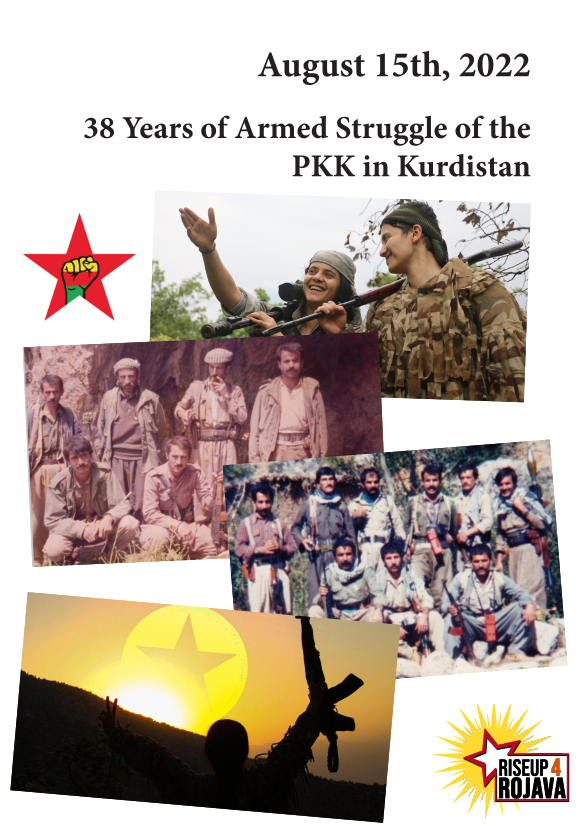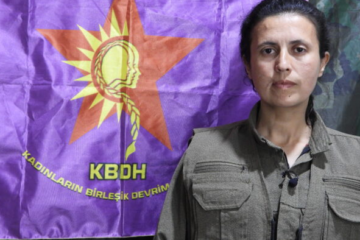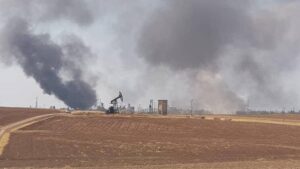
Preface
August 15th 2022
38 years ago the Kurdistan Workers Party started armed struggle. With the offensive of August 15th 1984 and with the proclamation of the liberation forces of Kurdistan (HRK) the struggle against Turkish colonial fascism was advanced to a whole new level. The attacks on the outposts of the Turkish occupation in Eruh and Şemzîman might have been comparatively of small military significance but they opened a new chapter in the newer history of Kurdistan, Turkey and the Middle East as a whole. While after the military coup of September 12th 1980 a heavy weight was put on the whole country, the sound of the first shots on August 15th broke through the deadly silence.
The big revolutionary organizations and social movements of the 70s were crushed and most of its activists, members and sympathizers went to Europe in search of safety from the brutal NATO-militaryjunta. The young Kurdistan workers party as well was hit heavily, not even 2 years after its establishment and had to accept heavy losses. Thousands of caders and sympathizers were imprisoned or murdered, the organizational web was torn and the freedom of movement heavily restricted. Thanks to the foresight of Abdullah Öcalan, who already in 1979 warned insistently of the possibility of a military coup, it was possible for the party to retreat the small amount of around 250 of its cadres into safe areas, at the beginning to Syria and later to Lebanon. In the Camps of the Palestinian liberation movement the party was able to restructure under the leadership of Abdullah Öcalan and to prepare its coming tasks.
For Abdullah Öcalan and the PKK it was clear that the path in to the foreignness of Europe would lead to liquidation and the disintegration of the organization. Only a return to Kurdistan, a continuation of the struggle where it started and with the society that had to lead it, could be a valid option and could prevent the marginalization. With this in mind the preparations to build a guerrilla army that would return to the country and declare war on colonization soon started. But internal organizational problems, the continuing fight about the line with the compromising and opportunistic tendencies, as well as the outer circumstances, led to the preparations taking more time than originally planned. Also the invasion of the israely army in 1982 stumped the build up and educational works.
At this time the militants of PKK fought shoulder to shoulder with the partisans of the Palestinian organizations against the Zionist occupation forces. The defense against the Zionist aggression was not only an important military experience but it also formed a lasting band between the fight of the Kurdish and the Arab people. With the offensive of 1982 imperialism and the israely occupation tried to break the revolutionary wave in the middle east that had been lasting since the 60s and to bring an end to the middle eastern guerrilla. But the offensive of August 15th 1984 brought this fight from the valleys and plains of Lebanon and Palestine to the mountains and peaks of Kurdistan, kept and protected it like embers and reignited the fire again. With the offensive of August 15th a new epoch of guerrilla warfare not only for the peoples of Kurdistan and the middle east but for all of struggling humanity. While in the 90s the armed struggles in Africa, Asia and Latin America as well as in the metropolis had to endure one defeat after another and broke apart under the pressure of a counter revolution that had been going on the offensive, in the valleys and mountains of Kurdistan a revolutionary army, that made the preservation of guerrilla warfare as a method and its advancement into the 21st century as their holy duty, gathered. Despite all the attacks the fight of PKK was able to persist through all unfavourabilities and became day by day a strong factor in the region. What started as a small group of 15-20 militants, that were determined to the utmost, grew to an army that would change the face of the middle east for ever.
Out of this small group of fighters there grew the power which gave birth to the revolution of Rojava and today freed more than one third of Syria. Starting with 20 rusty, old and rickety rifles from the black market it became rockets, heavy guns and tanks, which nowadays are ready to defend the revolution against every aggressor. Starting with 20 partisans, roaming through the mountains ungainly, without knowledge on how to protect themselves against adversity of nature and the tough life, they became a guerrilla army, which nowadays brings one of the biggest military machines with all their equipment to the edge of despair, using their fancy methods, perfected tactics and their unique style of moving around. The method of the guerrilla of the 21st century, developed by the PKK, has proven, that even in the 21st century the greatest and most powerful technique is still the human itself and even the most sophisticated machinery is doomed to failure facing the will and the creativity of a trained and professionalized guerrilla force. The 15th of August is insofar relevant all over the globe today, because today the PKK was able to prove the method of the guerrilla also in the 21st century to be not outdated and obsolete but rather, maybe today more than ever before, a universal weapon of the suppressed in the fight against a sheer overpowered enemy now and in the future. The 15th of August and the ongoing and unbroken guerrilla warfare in Kurdistan is the proof nothing is impossible and the hope for another world does not have to stay a dream or distant utopia.
This brochure shows the impression of this reality and can become a source of inspiration and power for the readers in the imperialist metropolises. This makes it even more important to take this knowledge of the past 38 years of the revolutionary movement and to make it accessible and to collectivize it. With this one and many other brochures and texts there were many steps taken in this direction, but still there is a sheer infinite treasure trove of experience and knowledge concealed. It is the task of all of us to appropriate this knowledge, to study the experiences of the revolution in Kurdistan on the basis of authentic material and to incorporate them in the fights for freedom worldwide.s


